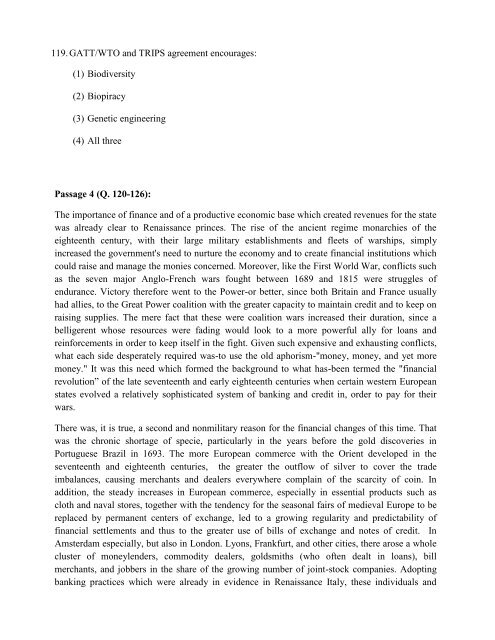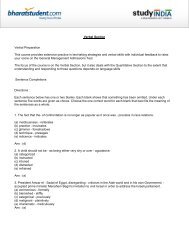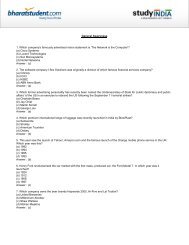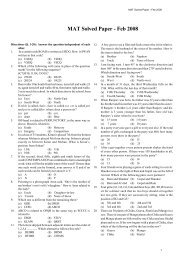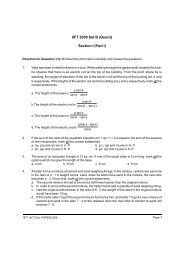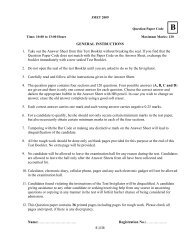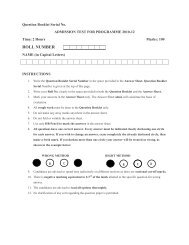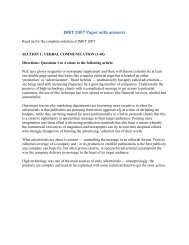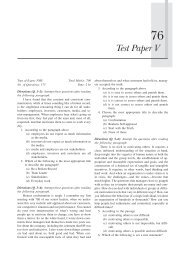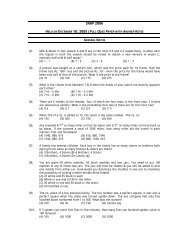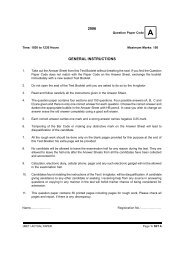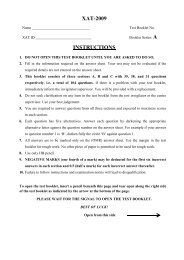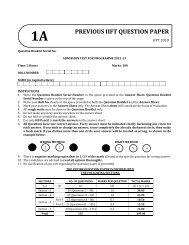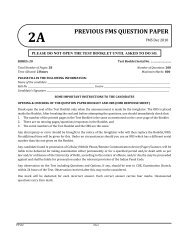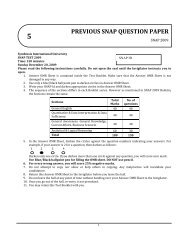SERIES 11 Test Booklet Serial No - Bharatstudent.com
SERIES 11 Test Booklet Serial No - Bharatstudent.com
SERIES 11 Test Booklet Serial No - Bharatstudent.com
Create successful ePaper yourself
Turn your PDF publications into a flip-book with our unique Google optimized e-Paper software.
<strong>11</strong>9. GATT/WTO and TRIPS agreement encourages:<br />
(1) Biodiversity<br />
(2) Biopiracy<br />
(3) Genetic engineering<br />
(4) All three<br />
Passage 4 (Q. 120-126):<br />
The importance of finance and of a productive economic base which created revenues for the state<br />
was already clear to Renaissance princes. The rise of the ancient regime monarchies of the<br />
eighteenth century, with their large military establishments and fleets of warships, simply<br />
increased the government's need to nurture the economy and to create financial institutions which<br />
could raise and manage the monies concerned. Moreover, like the First World War, conflicts such<br />
as the seven major Anglo-French wars fought between 1689 and 1815 were struggles of<br />
endurance. Victory therefore went to the Power-or better, since both Britain and France usually<br />
had allies, to the Great Power coalition with the greater capacity to maintain credit and to keep on<br />
raising supplies. The mere fact that these were coalition wars increased their duration, since a<br />
belligerent whose resources were fading would look to a more powerful ally for loans and<br />
reinforcements in order to keep itself in the fight. Given such expensive and exhausting conflicts,<br />
what each side desperately required was-to use the old aphorism-"money, money, and yet more<br />
money." It was this need which formed the background to what has-been termed the "financial<br />
revolution” of the late seventeenth and early eighteenth centuries when certain western European<br />
states evolved a relatively sophisticated system of banking and credit in, order to pay for their<br />
wars.<br />
There was, it is true, a second and nonmilitary reason for the financial changes of this time. That<br />
was the chronic shortage of specie, particularly in the years before the gold discoveries in<br />
Portuguese Brazil in 1693. The more European <strong>com</strong>merce with the Orient developed in the<br />
seventeenth and eighteenth centuries, the greater the outflow of silver to cover the trade<br />
imbalances, causing merchants and dealers everywhere <strong>com</strong>plain of the scarcity of coin. In<br />
addition, the steady increases in European <strong>com</strong>merce, especially in essential products such as<br />
cloth and naval stores, together with the tendency for the seasonal fairs of medieval Europe to be<br />
replaced by permanent centers of exchange, led to a growing regularity and predictability of<br />
financial settlements and thus to the greater use of bills of exchange and notes of credit. In<br />
Amsterdam especially, but also in London. Lyons, Frankfurt, and other cities, there arose a whole<br />
cluster of moneylenders, <strong>com</strong>modity dealers, goldsmiths (who often dealt in loans), bill<br />
merchants, and jobbers in the share of the growing number of joint-stock <strong>com</strong>panies. Adopting<br />
banking practices which were already in evidence in Renaissance Italy, these individuals and


